Erstellt am: 6. 9. 2014 - 12:19 Uhr
Cheeky, Provocative and Inspiring
Alles zur Ars
- Cheeky, Provocative and Inspiring The Ars Electronica festival in Linz has reinvented itself. It still makes you think, but it makes you laugh too.
- Facebook auf Kassette Ganz schön retro, die Interface Culture auf der Ars
- Bettelnde Roboter Roboter, die trommeln, malen und auch putzen können!
- Wie LSD in der Schulmilch Fantastische Erscheinungen auf der Ars. Zum Mitmachen!
- Anders Electronica Was man sich vorstellen kann unter einem Festival für "Kunst, Technologie und Gesellschaft"
- Alles zur Ars auf FM4
There's much to love about the Ars Electronica 2014. There's a mischievous sense of humour at work, a refreshing irreverence and mockery of our trust in the power of the machines that we have invented.
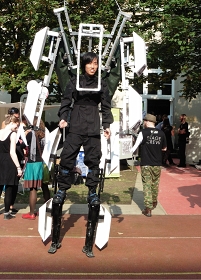
Chris Cummins
With the title “C... what it takes to change”, the festival, which was established 35 years ago, is marking a new direction, with more emphasis on public participation.
After years spent predominately in the impressive, but ultimately sterile confines of the glassy Brucknerhaus, Ars has gone downtown – nesting in a dozen inner-city venues.
Eclectic Venues
This year you will find exhibits under the pious vaults of Mariendom, or the New Cathedral, or in the much more profane as a commercial bank a large shopping mall, where bustling trade goes on unhindered among exhibits that questioning and challenge are throw away culture. Moving into the city was an essential part of living up the title of the festival, says Ars Electronica director Gerfried Stocker, "It was a great way to focus on doing everything in a different way."
"We want to establish a joyful relationship to change," says Stocker, "In Europe we have a very negative relation to change. We think it is something that is necessary when we are in trouble. But change can be fun and inspirational and drives us into the future,"
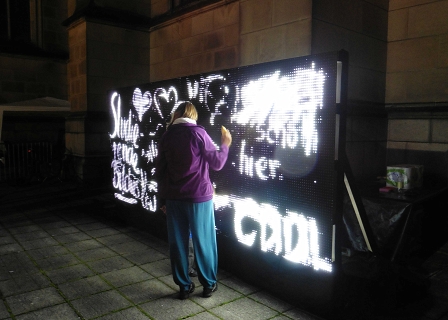
Chris Cummins
Our Dependence is Full of Nuance
A big theme this year is our relationships with the machines that we believe serve us. Fun is poked at our often slavish belief in the power of new technology.
In "Skeletonics" the Japanese trio Reyes Tatsuru Shiroku, Tomohiro Aka, and Keiju Nakano have turned man into a giant robot, something reminiscent of the Transformer movies, but there isn't a single wire or monitor in the structure. Despite its space age appearance all movement is powered by human muscle alone: "It's pretty tiring," admits Shiroku.
But there is an element of play here, points out ARS guide Rosy Grillmaier who was showing me around. "It is a robot without computers, but it was designed using hi-tech computer technology." We need computers and we don't need computers - our dependence is full of nuance.
Touchy
It's hardly new to bemoan the alienating effect the avalanche of new gadgetry and social media networks, but my festival hero, a Hong Kong-based artist called Eric Siu, drew attention to this alienation in a way that was both funny and moving.
I found Siu shufflingly sightlessly down echoing corridors of the Akademisches Gymnasium, a school that has been temporarily colonized by the festival this year. Calling himself "Touchy", Liu had placed a box shaped camera on his head, with the shutters covering his eyes so that he looked like a bug-eyed alien from the early romantic age of Steven Spielberg's fantasy.
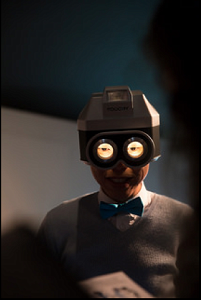
tom mesic/ARS electronica
Touchy, a half-man and half-camera hybrid with lens-shutters covering his eyes so that he remains blind until a human touches a small globe in his hands. This opens the shutters and, momentarily he can see. When I touched him, his eyes blinked with enthusiastic gratitude. "Hold down for ten seconds and look me directly in the eyes," he instructed, somewhat romantically, and when I obeyed a digital photo of me, looking surprised, unshaved an altogether ropey, appeared on the back of his helmet.
It is a metaphor about blindness. Our gadgets were closing us off from each other anall-seeing eye of social media and hi-tech gadgetry is making us blind, just as Touchy is blind without human touch..
"I created Touchy to encourage off-line communication. I found the over reliance on virtual networks de-humanising. So I wanted to bring communication back to reality."
"Never underestimate an illiterate grandmother"
The festival is not only focused on technology but on our relationship to that technology, and one of the most inspiring delegates, a man who has brought about real change to rural communities in South Asia and Africa, is a 70 year old Indian called Sanjit "Bunker" Roy.
His basic theory is that we have needlessly turned too many people away from the digital revolution on the grounds that they are too simple to understand the technology that could transform their lives. To prove his point Bunker set up the Barefoot College where he has taken thousands of illiterate grandmothers from rural communities and, over 6 months, taught them to be solar engineers.
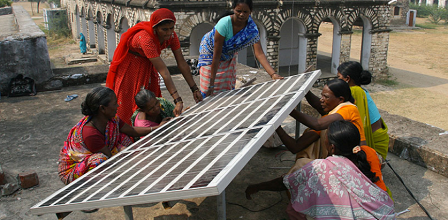
Barefoot College
He chooses older women because, he says, they are the stable pillars of the society. While young adults often leave the villages looking for work or a better elsewhere, it is often the grandmothers that tend to stay and are utterly committed to the communities where they have lived their lives.
Roy is angered that these people are so often disregarded because of their lack of formal education: "Never let school get in the way of education," he says, quoting Mark Twain. Roy says they possess the skills, traditional knowledge and practical resourcefulness that make them perfect engineers if taught in the right way. "Never underestimate a grandmother," he tells me, waggling a finger, "she has the capacity and competence to pick up the most sophisticated technology anywhere in the world.
Supergrannies
On their return they install, maintain and service the solar panels that bring, often for the first time, light to their communities. Previously the villagers had spent much of their budget on environmentally nefarious kerosene lamps. The new solar systems save the villagers money, which can be used anywhere, and the solar energy is healthier for their lungs and for the local environemnt while the women's role as engineers gives them new prestige in their villages.
"When she comes back she is a tiger," he says of typical graduate of the Barefoot College. "The villagers barely recognise her. She has enormous confidence.She has enormus competence, she has leadership qualities and she feels a reponsibility to her community."
Besides the solar engineers, his school has helped illiterate poor architects and teachers. His projects have involved installing design buildings that collect every drop of water. After a day of the reflection of the harmful impact that gadgetry has had on human communication, it was refreshing to hear how well-thought out technology was bringing a new self-confidence and self-worth to the engineer grannies.
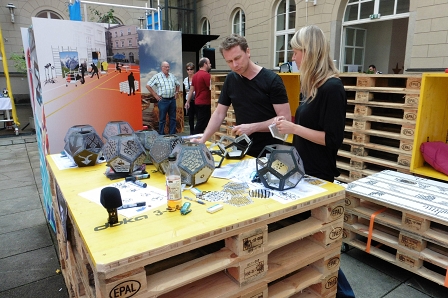
Chris Cummins
The various locations give the festival the endearing atmosphere of organised chaos, but with another 240 art projects and installations on display, it's easy to get confused or lost and that's why I had turned to Rosi Grillmair of the "We Guide You" service for help.
Rosi has devised 8-themed tours to help visitors navigate the bounty of art. I told her I wanted to be surprised and she took me to an ice salon to see the exhibit "Learn to be a machine" from Ho Chi Lau, also from Hong Kong.
We took a comfy seat on a black wooden box and looked up at a screen that was watching us with a very realistic looking video of human eyes which we are led to believe we can remotely control by stroking a trackball: There we realise that the artist is simply lying in the box beneath us. They are his eyes."He sees what we do with the track ball and obeys. It's a human being who came all the way to Linz to lie in a box all day."
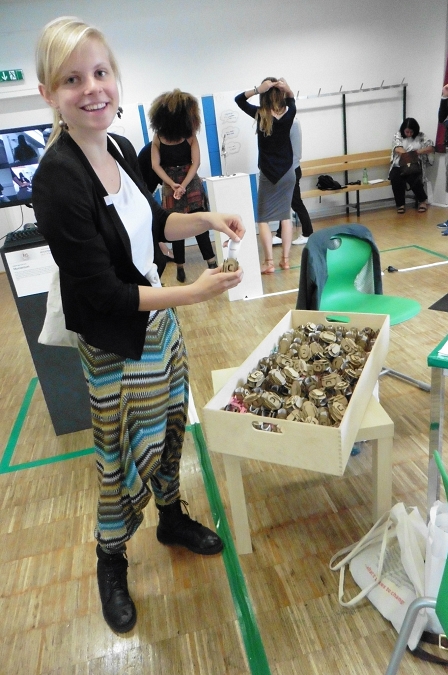
Chris Cummins
That's what I like: among the serious topic, it's the eccentrics who still rule the Ars electronica.


